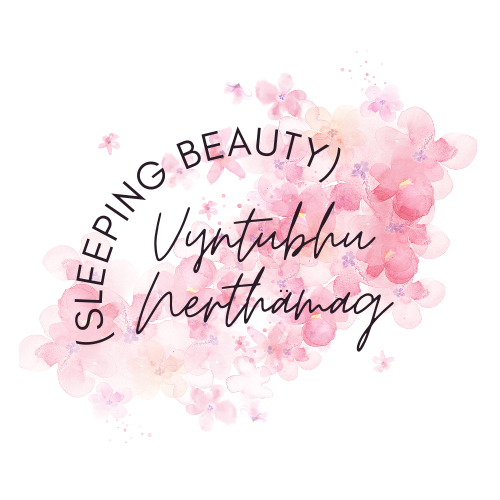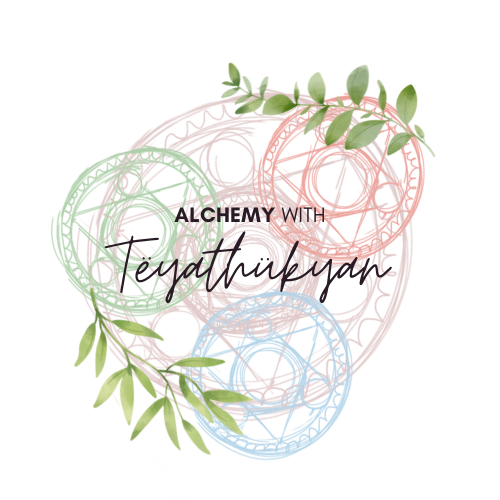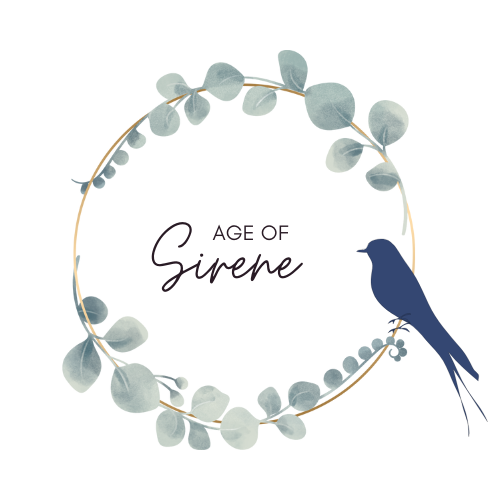This has been written as a spin-off to Age of Sirene and includes information about the Lighting Tree Universe and the conlang, Tëyaθükyan, the language of the fae.
This Tëyaθükyan handbook has been edited by Sanja Lorafaren with additional information about the usage of Kludlan and its importance to the Creatures of the Night.
Sleeping Beauty by Grimm Brothers translated to Kludlanyng (the old Kludlan).
Esthero’s Letter
The study of Thykyan was mostly reserved for the Seeds who studied under the tutelage of the Lucius Temple. As a Seed, I felt the need to write this book to allow others to learn the language of our ancestors, to reconnect us to the truth long ago found by our fore-tree, Wing of Solum and Nou of Anima.
There is no greater joy than in sharing the knowledge and belief that we, as individuals, are capable of greatness. We must only be open to the possibilities and driven to unlock the truth buried within ourselves.
We are all Seeds.
The History of Tëyaθükyan
The language of the fae.
Tëyaθükyan is an endoethnonym synthetic language. Tëya (tœ/ia) is how the Faes refer to themselves. θükyan (thee/kian) means language or saying. Effectively, together it means “Our Language”.
Thykyan is the shortened version that is often used when referring to the language by others. It is commonly used by Alchemists after the genocide of Faes known as the Infernal of Faes, a war against the creatures some centuries ago. The spelling of certain symbols/letters has also evolved through time and usage.
Each region within the Echerus Empire mixes Thykyan with their native language or Ancient Languages. These languages are:
- Ancient Dragon Language (ADL) Russian
- Serpent Mountain Language (SML) Azerbaijani
- Gigant Mountain Language (GML) Romanian
- Ancient Qilin Language (AQL) Chinese
- Ancient Anjana Language (AAL) Spanish/Gallaecian
- Klœdlan
Tëyathykyan was first spoken by Vir the Guardian, the Lighting Tree, and the Fae. The language was passed down to the four types of man: Solum, Unda, Anima, and Ignis. The tradition of passing down the language was prevalent during the earlier years of the world. This diminished once technology and science became more prominent. The earliest recorded of loss of speakers was during Nou’s time.
Nou was the last known Seed to have been taught directly by the Lighting Tree and Vir.
The version of the language most people speak today is a bastardised version.
Seeds of the Lucius Temple can all read and write Tëyaθükyan, but not all have the same level of proficiency of speaking the language. Most Alchemists are not well-versed in either aspect which is why other languages are mixed in. The difference in their ability to speak the language does not hinder their alchemical ability, but it does help increase if they are more versed in the languages they use.
There are only five people on record in the current history who are able to read, write, and speak fluent Tëyaθükyan within the Echerus Empire.
These are:
- Nina Dimdóttir, the only person who is not a Seed
- Esthero of Ignis
- Eiririan of Unda (Princess Ji-Won)
- Vivre of Unda
- A young girl, knighted at 12-years-old. Unnamed.
Derivatives
Klœdlan:
Klœdlan is a version of the old language spoken by the Creatures of the Night, mainly by faeries and dryads/nymphs as they are closely related to Faes. They would be like the Elves of Tolkien’s Universe.
Today, it is often spelled as Kludlan, which can be confusing as the letter “u” can be pronounced in two ways, as “oe” or “oo”.
* For the purpose of easier consumption, the rest of this dictionary will be written using the Kludlan spelling. *
Rules of the Language
Vowels
| θükyan Spelling | Kludlan Spelling | IPA | Notes |
| ɑ | a | ɑ | Short a’s; front |
| ä | ä | ä | Short a “eh” when at the start or end, long a “ay” if at the middle |
| a͡ʊ | ou | a͡ʊ | Said as “aw” or “au” |
| u | u | u | Short “oo”; back |
| œ | u | œ | Short u (like in French) |
| ʊ | o | ʊ | Long “oo”; front or “ee” |
| ë | e | e | Short e |
| ü | y | ʏ | Short i; front / long e Use ‘y’ if before vowel |
The spelling for Thykyan is mostly based on how they are spoken as the language (by the fae) first was made to be spoken and not written.
Writing came after the creation of the Giant Tree, where the Lucius Temple is now erected.
The Giant Tree was the first settlement that Solum, Unda, Anima, and Ignis created together. It is also where Unda first began to create a writing system for their language. Later, it would be learned by the Creatures of the Night who dwelled in the shadows of the land. That is also how Klœdlan became a language.
The written Klœdlan language was first documented during Nou’s time by Gärd and her husband, Wing of Solum.
Consonants
| θükyan | Kludlan | IPA | Notes |
| b͡h | bah/ bh / b | b͡h | Sound “bah” / bah when written in Klœdlan |
| m͡h | mah/ mh/ m | m͡h | Sound “mah” / mah when written in Klœdlan |
| ð | dh | ð | “Dh” or “dah” |
| g | g | g | Hard g or j, interchangeable |
| n / ŋ | n / ŋ | n /ng | |
| ʍ | hw | ʍ | “Hw” |
| r | r | r | r/l |
| t | t | t | |
| θ | th | θ | Th when written in Klœdlan |
| v | v | v | |
| x | x | kh | |
| N/A | s | s | ‘Es’ ‘See’ |
Nouns have three cases:
- Nominative is the doer of a verb: dog bites man.
- Accusative is the done-to of a verb: man bites dog.
- Genitive is the possessor of something: dog’s tail hits man.
- Dative is the recipient of something: man gives ball to dog
Nouns
| Θükyan Original | Kludlan Spelling | |
| Nominative | No affix ʍʊʍa͡ʊ /‘hwʊhwa͡ʊ’/ dog (doing the verb) | Hwohwau |
| Accusative | Suffix -u ʍʊʍa͡ʊu /hwʊhwa͡ʊu’/ (verb done to) dog | Hwohauu |
| Genitive | If starts with vowel: Prefix g- Else: Prefix gy- If ends with a vowel: Suffix -t Else: Suffix -ut ʍʊʍa͡ʊt /‘hwʊhwa͡ʊt’/ dogʼs | Hwohwaut |
| Dative | Prefix b͡hʊ- b͡hoʍʊʍa͡ʊ /‘b͡hʊhwʊhwa͡ʊ’/ to (the/a) dog | Bhohwohwau |
| Θükyan Original | Kludlan Spelling | |
| Singular | No affix ʍʊʍa͡ʊ /‘hwʊhwa͡ʊ/ dog | Hwohwau |
| Plural | If starts with vowel: Prefix m͡h- Else: Prefix m͡hy- If ends with a vowel: Suffix -ð Else: Suffix -að ʍʊʍa͡ʊð /‘hwʊhwa͡ʊð/ dogs | Hwohwaudh |
| Θükyan Original | Kludlan Spelling | |
| Definite | θʊ /θʊ/ the | Tho |
| Indefinite | xʊ /khʊ/ a, some | Kho |
Verbs
| Θükyan Original | Kludlan Spelling | |
| Present | No affix ðaŋ learn | dang |
| Past | ʊðaŋ learned | odang |
| Future | gʊðaŋ will learn | gudang |
Use of verb tenses wasn’t common until after the establishment of the Giant Tree some decades later. It is unsure whether or not the use of the tenses were created as civilisation became more common, opposing the nomadic tendencies of man.
There are no known records of any other form changes.
Possessive Determiners
| Θükyan Original | Kludlan Spelling | |
| 1st singular my | b͡hu | bahu |
| 2nd singular your | m͡hu | mahu |
| 3rd singular masc his | daha | |
| 3rd singular fem her | tat | |
| 1st plural our | m͡hü | mahy |
| 2nd plural your (pl) | tœ | tu |
| 3rd plural their | b͡hon | bahon |
Pronouns
| Ergative | Absolutive | Genitive | Dative | |
| 1st singular | gü /gy/ I | dakh /ðakh/ me, I | täkh /täkh/ mine | m͡ha͡ʊ /m͡haʊ̯/ to me ta͡ʊt /taʊ̯t/ to me |
| 2nd singular | xa͡ʊ /khaʊ̯/ you | xan /khan/ you | a͡ʊ /aʊ̯/ yours | tat /tat/ to you |
| 3rd singular masc | m͡hä /m͡hä/ he, it | thäm͡h /θäm͡h/ him, it | khü /khy/ his, its | dann /ðann/ to him, at it |
| 3rd singular fem | b͡hœ /b͡hœ/ she, it | od /ʊð/ her, it | b͡häʍ /b͡hähw/ hers, its | dœ /ðœ/ to her, at it |
| 1st plural | thä /θä/ we | tœth /tœθ/ us, we | m͡hëm͡h /m͡hëm͡h/ ours | dom͡h /ðʊm͡h/ to us |
| 2nd plural | m͡hä /m͡hä/ you all | gäm͡h /gäm͡h/ you all | xœ /khœ/ yours (pl) | xä /khä/ to you all |
| 3rd plural | tekh /tëkh/ they | gäth /gäθ/ them, they | œŋn /œŋn/ theirs | tü /ty/ to them |
Derivational Morphology
| Θükyan Spelling | Kludlan Spelling | |
| Adjective → adverb | If ends with vowel: Suffix -g Else: Suffix -ag | |
| Adjective → noun (the quality of being [adj]) | Suffix -ä | |
| Adjective → verb (to make something [adj]) | If ends with vowel: Suffix -gu Else: Suffix -aʊ̯gu | Else: Suffix -augu |
| Noun → adjective (having the quality of [noun]) | Suffix -y | |
| Noun → adjective relating to nouns (e.g. economy → economics) | If ends with a vowel: Suffix -ð Else: Suffix -äð | If ends with a vowel: Suffix -dh Else: Suffix -ädh |
| Noun → verb | Suffix -a | |
| Verb → adjective (result of doing [verb]) | If ends with vowel: Suffix b͡hœ Else: Suffix -b͡hœt | If ends with vowel: Suffix bhu Else: Suffix -bhut |
| Tending to | If ends with vowel: Suffix -t Else: Suffix -at | |
| Verb → noun (the act of [verb]) | Suffix -œ | |
| Verb → noun that verb produces (e.g. know → knowledge) | Suffix -um͡h | Suffix -umah |
| One who [verb]s (e.g. paint → painter) | If ends with vowel: Suffix -tä Else: Suffix -œtä | Else: Suffix -utä |
| Place of (e.g. wine → winery) | If ends with vowel: Suffix -n Else: Suffix -yn | |
| Diminutive | If ends with vowel: Suffix -n Else: Suffix -aʊ̯n | Else: Suffix -aun |
| Augmentative | If ends with vowel: Suffix -ŋ Else: Suffix -yŋ |
Number – 10 Number System
| Θükyan Spelling | Kludlan Spelling | |
| 1 | Dyët | Dyet |
| 2 | Nrä | Nray |
| 3 | De | De |
| 4 | Ated | Ated |
| 5 | Dä | Dä |
| 6 | Amah | Amah |
| 7 | Hwät | Hwät |
| 8 | Duʍ | Duhwa |
| 9 | Dab͡h | Dabah |
| 10 | Äto | Äto |
| 11 (10 and 1) | Ätovedyet | Ätovedyet |
| 100 | Dyet ä | Dyet ä |
| 101 (one hundred one) | Dyet ä dyet | Dyet ä dyet |
| 200 | Nrä ä | Nray ä |
| 1000 (one thousand) | Dyettäkh | Dyettäkh |
Sentence Structure
The basic Thykyan sentence structure is Subject, Object, Verb (SOV). This is the same sentence structure you see in Japanese, Korean, and to some extent German.
Kludlan follows similarly, but like German will also vary to Subject, Verb, Object.
We will follow the Kludlan sentence structure as it is my native language. Thykyan, though became a written language thanks to Unda, was not meant to be one. It was simply the language that the Lighting Tree first spoke.
Vir, the first Fae, and creation of the Lighting Tree, write in Kludlan as they see themselves as a Creature of the Night– a being that was once simply referred to as someone not born directly from the light cast by the Lighting Tree. The term means very differently in present times.
Θükyan Translation
| Simple | I see a man. Gy thorum nangu. I man see. |
| Compound | She took her dog for a walk, and they found a friend. Gäth hwohwau okhag ve gäth lädlu nangu. (They) dog walked and (they) friend found. |
| Complex | Since a thunderstorm happened, my dog hid under the bed. Anima kahwet, täkh hwohwau mahähwa nab. Sky angry, mine dog shelter take. |
Kludlan Translation
| Simple | I see a man. Gy nangu thorum. I see man. |
| Compound | She took her dog for a walk, and they found a friend. Gäth okhag hwohwau ve gäth nangu lädlu. (They) walked dog and (they) found friend. |
| Complex | Since a thunderstorm happened, my dog hid under the bed. Anima kahwet, täkh hwohwau nab mahähwa. Sky angry, mine dog take shelter. |






